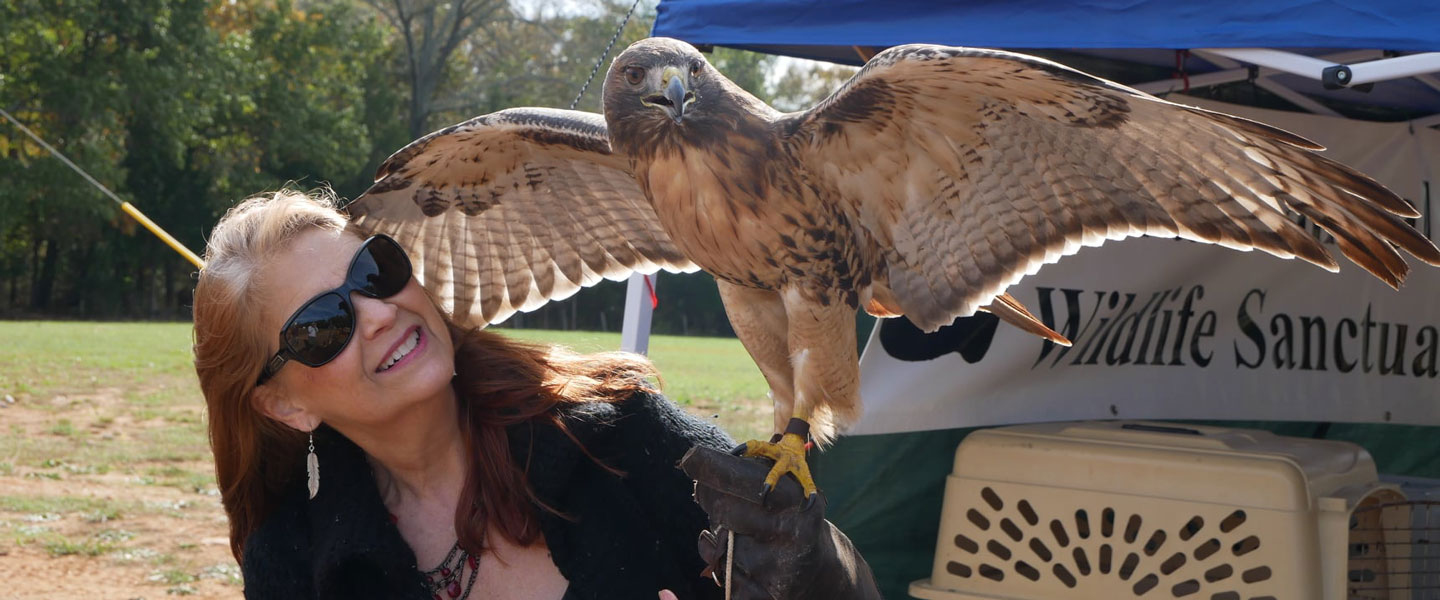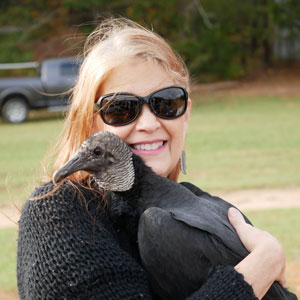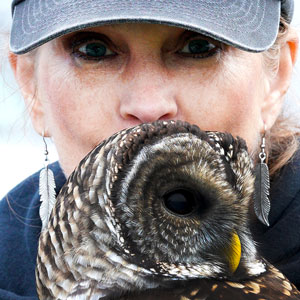
Driven to Heal: Mac Curry
This is an excerpt from the Spring/Summer 2022 issue of the Upstate Advocate, Upstate Forever's twice-yearly publication. To read a digital copy of the complete publication, please click here.
 Mercedes "Mac" Curry
Mercedes "Mac" Curry
FOUNDER, PAWS ANIMAL WILDLIFE SANCTUARY
Growing up, I always found critters who needed help. My parents sent them off to others for care, but in my 20s, I decided I should learn how to care for them myself. By the time I moved to SC in the fall of 2002, I was an experienced wildlife rehabilitator. We chose South Carolina after a series of very positive conversations with SCDNR, who assured me I could continue my work here. So, in the spring of 2003, we opened PAWS Animal Wildlife Sanctuary in Laurens County.
We searched properties for a year before finding our Sanctuary, which encompasses about 180 acres of woods and streams. I love this property. The topography is beautiful, with deep ravines and overlooks and some great flat areas where we set up our buildings and home sites. It’s my personal slice of heaven that also provides home and release areas to our rehabilitated wildlife.
As a wildlife rehabilitator, I work to save, rehab, and release individual animals in need. As an educator, I help people learn species’ value and how to peacefully coexist. Many human-wildlife conflicts are inadvertently caused by humans, but we can help correct these problems, even if we didn’t cause them. It’s the right thing to do as stewards of our planet.
Humans don’t always understand the place each creature occupies in nature. Sometimes, humans label animals a ‘nuisance’ and kill them rather than finding ways to peacefully coexist. Sometimes, people think there are ‘so many’ of them that it doesn’t matter.
As I often explain to callers surprised to see deer, raccoons, squirrels, skunks, opossums, and many other species living in their communities, animals do not have the luxury of packing up and moving out to less inhabited spaces. They live or die where they are born.
 While raccoons and squirrels have adapted best to urban settings, others like bats, chimney swifts, and barn owls suffer the most. We have several permanent owl residents at PAWS who came to us after incidents with humans. Our educational barred owl, Orso, has vision issues from his car collision, which prevents him from catching enough prey. And our great horned owl, Emerson, came to us after getting caught in baseball backdrop netting. She has permanent wing damage that prevents her from flying, but she loves getting thoroughly soaked during rainstorms!
While raccoons and squirrels have adapted best to urban settings, others like bats, chimney swifts, and barn owls suffer the most. We have several permanent owl residents at PAWS who came to us after incidents with humans. Our educational barred owl, Orso, has vision issues from his car collision, which prevents him from catching enough prey. And our great horned owl, Emerson, came to us after getting caught in baseball backdrop netting. She has permanent wing damage that prevents her from flying, but she loves getting thoroughly soaked during rainstorms!
If the public finds an injured wild animal, they should contact someone who has training, supplies, access to veterinary care, and can recognize life-threatening problems. While some finders recognize problems too, others think they’re helping but do more harm by keeping the animal in their possession, which also breaks state and/or federal laws and risks disease and parasite transmission (rabies is actually low on the list). Another common misconception is that wild animals need food immediately, but there are several steps we take before feeding an animal, especially an emaciated one.
If someone does want to rehabilitate wildlife, the time to learn is before they have a wild animal in their possession. Otherwise, we end up with imprinted animals, like our turkey vulture, Kiki, who was improperly raised by humans and became too bonded to them. It is important to keep our vultures in the environment because they remove carcasses quickly and help prevent the spread of disease and bacteria; their digestive tract can even remove Anthrax!
I would love to see a kinder and gentler world between humans and between humans and other creatures. I’m a strong proponent for peaceful coexistence. Humans can live in the same areas as wildlife without conflict.
The public can help by understanding that wildlife needs to remain wild. It is not a good idea to attract wild animals to your yard with food, because what one resident considers lovely, another might consider a nuisance. That being said, in the heat of summer and dry spells, people can set out water bowls on the far fringes of their yards for thirsty animals.
People can also help by not littering. Many don’t realize that discarding trash on the road, even if it’s biodegradable, attracts small animals who come to investigate interesting odors. It doesn’t take long before predators learn that trash might be hiding prey and that’s when they or the prey get hit.
I think it’s fitting for humans, as caretakers of the planet, to help wildlife survive in situations we create.
If you find an animal in need, please call PAWS Animal Wildlife Sanctuary at (864) 715-2171.
For more information about PAWS, visit paws-sc.com.
